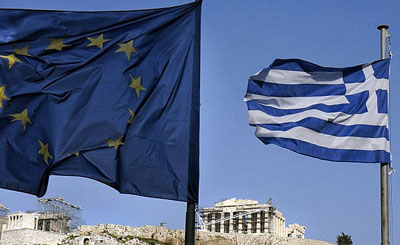The Greek crisis and the clash of philosophies within the EU

 Listening to German Finance Minister Wolfgang Schäuble and his Greek counterpart Yanis Varoufakis speaking about the recent Eurogroup agreement on Greece, one could be forgiven for thinking they were talking about two completely different texts. There are obviously deep differences between them over substance and status that are far from being resolved.
Listening to German Finance Minister Wolfgang Schäuble and his Greek counterpart Yanis Varoufakis speaking about the recent Eurogroup agreement on Greece, one could be forgiven for thinking they were talking about two completely different texts. There are obviously deep differences between them over substance and status that are far from being resolved.
The outcome is unclear. Both sides have bought time as Greece’s proposed revenue raising measures undergo further scrutiny in the Eurogroup. Greece can claim that it has achieved success by winning more flexibility on demands that it run a 4.5%primary surplus. It can also point to increased understanding from Eurogroup partners on conditional financing for social measures and the need to avoid additional austerity measures as steps in the right direction. Germany can stress Greece’s commitments on debt repayment; the fact that its economic adjustment programme will continue to be assessed by the European Commission, European Central Bank and the International Monetary Fund; and an undertaking from Athens to avoid unilateral measures.
Greece continues to emphasize the need for a fundamental change in the European Union’s economic philosophy. It insistsTroika-inspired austerity programmes have left the country with unacceptable levels of poverty. Regardless of ideology, the the level of dissatisfaction in the country means the new Greek government will find it impossible to pursue similar policies to its predecessor.
In contrast, a hegemonic Germany insists on maintaining the current economic philosophy, not because it is good for Europe but because it considers it beneficial for its own interests. This is despite the recession now knocking on Germany’s door. For Berlin, it seems, ideology and status are the top priorities.
Inevitably the clash of the two philosophies will continue. One could hope the philosophy underpinning current eurozone policy changes to encourage growth without losing sight of the need for economic restructuring and rationalisation. The years of crisis have laid bare deep flaws in years of crisis the eurozone’s architecture, and not just because of Greece. Ireland, Spain, Portugal and Cyprus are in essence confronting different facets of the same problem. Change will require Germany to adapt its philosophy and perspective, but unfortunately, German thinking continues to confuse household economic management with macroeconomics. In the short term, the most likely scenario is more friction and demands for austerity measures aimed at strict fiscal discipline. It is doubtful whether this can be sustained over time.
As things stand, it is impossible for Greece to pay off its debts and meet its broader economic policy obligations. The private and public debts cannot be repaid under conditions of a deep and sustained recession. These conditions risk leading Athens to financial collapse and exit from the eurozone, despite declarations by officials on all sides on the importance of Greece staying in the currency bloc. Even default within the eurozone would create serious complications well beyond Greece.
The Greek government is emphasising the necessity of stepping up measures against fraud, corruption and tax evasion. The implementation of these measures will be very effective, if accompanied by a policy of substantial tax cuts at all levels and severe penalties for non-compliance. Otherwise, it will be very difficult for the government to raise the necessary public revenues.
While the debate about Greece continues, forthcoming elections in several other eurozone countries will further influence developments. The continuation of Germany’s obsessive policy approach will result in more friction and increased risk of eurozone exits, by design or accident. Recent recriminatory statements at intergovernmental and European level make it obvious that solidarity has evaporated and the EU has degenerated into a modern Tower of Babel. It is unfortunate that ECB Governor Mario Draghi put specific conditions on the inclusion of Greece in the bank’s monetary expansion programme. In this, the ECB appears to be acting more as member of the troika, rather than respecting its central bank mandate.
Developments in the coming months will be decisive for Greece and the rest of the eurozone. If the EU does not understand the broader implications of the Greek crisis and the need for a deep reflection on its future course, the Union will miss a golden opportunity to restore its reputation, both domestically and on the international stage.
The eurozone crisis constitutes the most serious challenge facing the EU since its establishment. Many technocrats, diplomats, academics and politicians were aware of the weaknesses underlying the eurozone’s foundations, but they could not foresee the depth and the extent of the problems exposed by the crisis. It is no surprise that the conventional economic philosophy behind austerity is being seriously challenged way beyond Greece, in the United States, Britain and in Brussels itself. It is essential that the shortcomings of this philosophy are addressed quickly and effectively. If not, the problems will only get worse. There is a growing risk that the ideological obsession with austerity will endanger the entire European project.
By Professor Andreas Theophanous
Find more: Contributing Authors





























